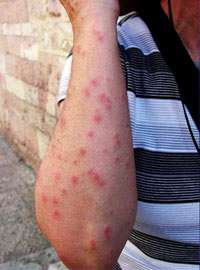Bed Bugs: Frequently Asked Questions
Bed Bug Control and Extermination ArticlesPest Control and Extermination Tips
How do you get bed bugs?
- It is uncommon to experience bed bugs in a single-family residence, so don’t be frightened by the recent hysteria.
- Bed bugs are more common in a high transient population, dorms and apartments.
- They are passed around from one infested home to the other.
- Although they are called “bed bugs,” the bugs can live anywhere that you are sedentary so that they can feed from your blood.

How to know if you have bed bugs?
- You find rust colored blood stains on your sheets.
- Small bites on arms and legs result in red swollen and itchy skin.
How to prevent bed bugs?
Sadly, the best prevention is to avoid contact with bed bugs altogether. If you have been in contact with bed bugs, it doesn’t mean that a new colony will sprout at your home. In order for bed bugs to proliferate at your property, you would have needed to import a pregnant female or a mated pair.
How to treat bed bugs?
- There is no at-home or over the counter remedy for bed bugs. Don’t even waste time trying different solutions — get them treated QUICKLY. If just a single pregnant bed bug is left in your untreated home, four months later you’ll have 9,600 of them. At the five-month mark you’ll have 31,500.

- If you spot any of the signs, a detailed and thorough inspection must take place by a professional. Bed bugs can hide where you would least expect.
- There is sometimes a physical removal of live bugs with a vacuum-chambered device. We seal the mattress and box spring with bug-proof encasements to ensure any bed bugs that might have remained hidden inside are never able to escape.
- We also apply targeted residual and contact insecticides. In the past year, we have employed heat treatments with great success.
Follow-up visits are also crucial and should be scheduled at intervals that match the hatching patterns of newly hatching bed bugs.
Click here for further information about bed bugs.







